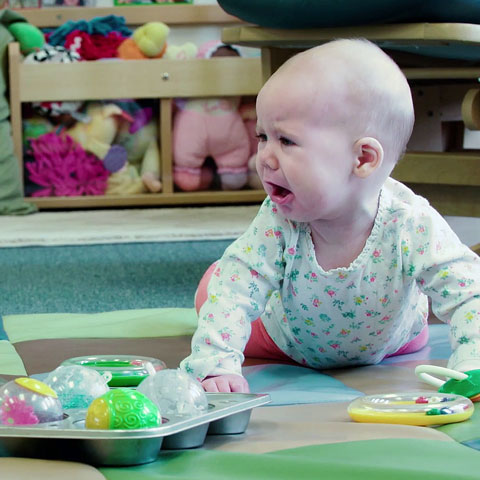About this Video
This Early Learning Moment provides an overview of Social and Emotional Development as explained in Illinois Early Learning Guidelines for Children Birth to Age 3. This section of the guidelines describes how infants and toddlers develop relationships with the people around them, develop a sense of self, and learn to be sensitive to the wants and needs of other people.
Video
Setting Up for Success
In the video, we learned about how adults support the social and emotional development of infants and toddlers.
Subsections for Social and Emotional Development
- Attachment Relationships
Children form secure attachment relationships with caregivers who are emotionally available, responsive, and consistent in meeting their needs. - Emotional Expression
Children demonstrate an awareness of and the ability to identify and express emotions. - Relationship with Adults
Children demonstrate the desire and develop the ability to engage, interact, and build relationships with familiar adults. - Self-Concept
Children develop identity of self. - Relationship with Peers
Children demonstrate the desire and develop the ability to engage and interact with other children. - Empathy
Children demonstrate an emerging ability to understand someone else’s feelings and to share in the emotional experiences of others.
Self-Assessment and Reflection
This video presented examples of how can support the social and emotional development of infants and toddlers. Now consider your interactions with infants and toddlers and how you might set up your space and interactions to give them a healthy start in their social and emotional development?
Does your space have:
- Places where adults can play and interact comfortably with individual children and small groups of children?
- Appropriate materials that are engaging to children and encourage them to explore and talk with peers and caregivers?
- Mirrors, family photographs, and other photographs that represent the children in your care that support the development of their sense of self?
Are you ready to:
- Talk with children about their thoughts and feelings even when children may be unable to respond verbally? (Some people call this “sportcasting” talk.)
- Encourage children to learn the names and faces of their caregivers, peers, and family members by making photographic displays or books?
- Respond in a supportive manner to the positive and negative emotional expressions of children?
- Help older infants and toddlers resolve conflicts during playtimes, such as when both children want to play with a particular toy?


